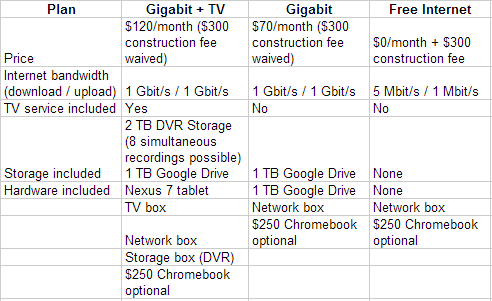What is Google Fiber?
Google Fiber is Google's project to build a broadband network infrastructure using fiber-optics to selected cities.
They offer the following plans:
Now, if you did not catch it, the speeds for the paid monthly internet are 1 gigabit per second - about 100 times faster than the average person's internet connection. We will get to the implications of this later on. And even the free internet at 5 megabit's per second is a decent speed for the price of FREE for seven years ($300 construction fee makes it technically $3.57 per month). I pay $50 a month right now for 12 Mbit/s for a service that is 85 times slower than Fiber's gigabit and even if I only had access to the free internet for a downgrade in speed I would gladly jump on that and save myself $3,900 dollars over the next seven years.
Where is Google Fiber?
It is live in Kansas City, Kansas; and Kansas City, Missouri since September 2012.
And announced just 3 days ago, Google will bring Fiber to Austin, Texas and have connected homes by mid-2014.
What Google Fiber means now?
Well, for one it is stimulating competition. As the hardware of computers have advanced to the point where the average user's computer is now very capable - internet speeds, while increasing, have not kept up with the processing speeds of computers, and the United States is lagging behind at 12th place (in early 2012) in average connection speeds.
 |
| Source: The Verge |
For those who are lucky enough to live in Kansas City, Kansas; Kansas City, Missouri; the possibilities are endless, and in fact, entrepreneurs and startups are flocking to areas where Fiber is live, most famously the Kansas City Startup Village, Hanover Heights on the map, where entrepreneurs and startups are gathering to collaborate and leverage their resources and take advantage of 1 gigabit internet speeds. On the Kansas City Startup Village's website there are currently 20 startups listed in the community.
But you can imagine the possibilities of not having to wait for any download. When Google Fiber first went live in KC, Mike Demarais, Threedee startup founder said, "It's unbelievable. I'm probably not going to leave the house."
So it's giving a Kansas City small businesses that cannot afford their own high-speed network a huge opportunity. Check out this example from the Wall Street Journal.
What Google Fiber means for the future?
Here is where things get interesting.
While 1 gigabit speeds will not happen for America overnight, expect them to shoot up quicker then you think as service providers scramble to remain competitive or at least prepare themselves for real competition.
But when it does happen, and we all get 1 gigabit speeds or better, everything will change, and here are four major changes you will see:
- Health care will be revolutionized. Imagine videoconferencing your doctor - seeing each other in high-definition, speech crystal clear - and consider how much difficult travel could be avoided for elderly, handicapped, etc. A doctor could see many more patients per day and patients would not have to wait as long for appointments. Google has announced it will bring Google Fiber to schools and hospitals for free in Austin, Texas.
- Digital educations will bolster. If you haven't read my post on Sugatra Mitra's proposal to revolutionize the education system using a digitally-based model, I suggest you do as it relates the importance of students having access to internet. But even within the traditional education system, according to the FCC, "students with broadband at home have a 7% higher graduation rate."
- The digital entertainment industry will explode, again. With YouTube, Netflix, Hulu, Amazon, and the myriad of online gaming communities, digital entertainment has grown exponentially the last few years and has only been hindered by slow internet speeds. With 1 gigabit, entire HD movies can be downloaded in a matter of seconds. Imagine how many YouTube videos you could watch in a row if buffering did not exist, and you get the idea.
- The online experience will change entirely. With 1 gigabit download speeds, companies could make extremely interactive, highly visual, moving, dynamic, and ridiculous websites and never have to worry about "average page load time". We are seeing this already with Microsoft's Xbox 720 - rumored to not have an optical drive, but rather only have downloadable games - these games would be huge in file size, some 50 GB, and this would only make sense where internet is competent. With gigabit internet speeds, any amount of content could be taken on.
 |
| I can't wait till the day I see that on my screen. Perhaps that day is not far off. |
Computers have become so capable that their evil-fighting potential is seriously impressive, but many of their applications are limited to their ability to receive and send information quickly, and thus computers' favorite new sidekick Google Fiber enters the scene to help save the day. What a team.
Computers - 6. Evil - 0.


